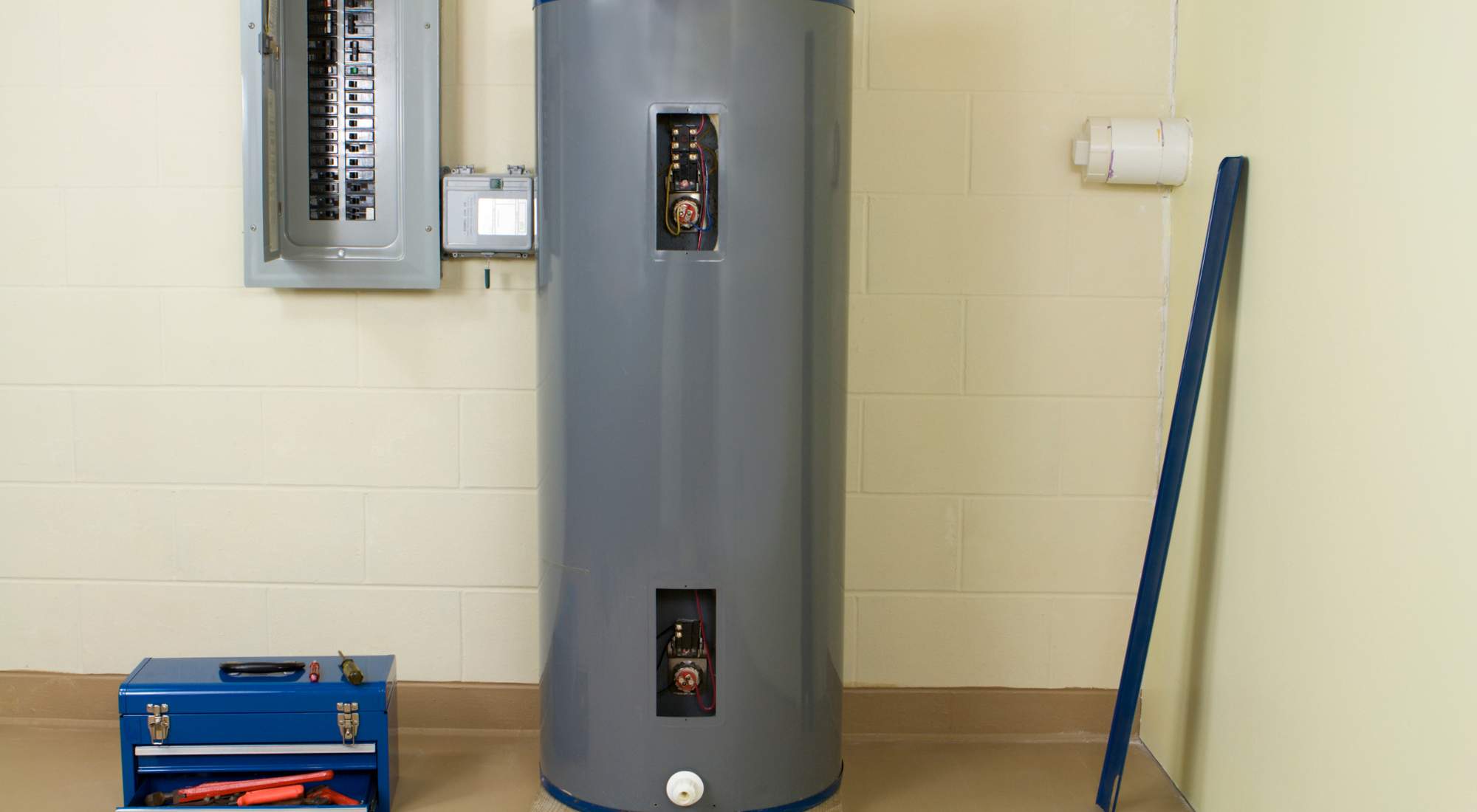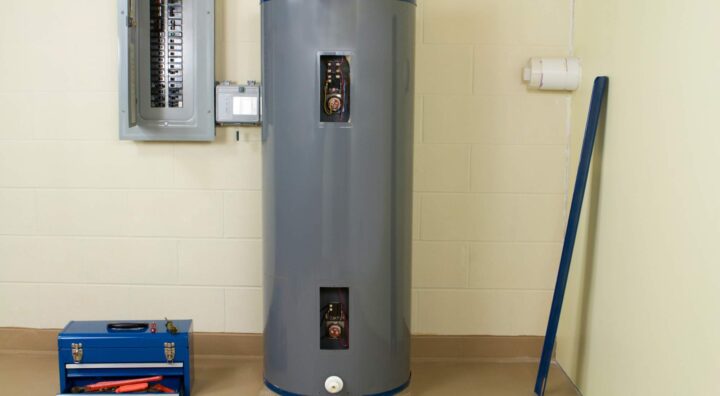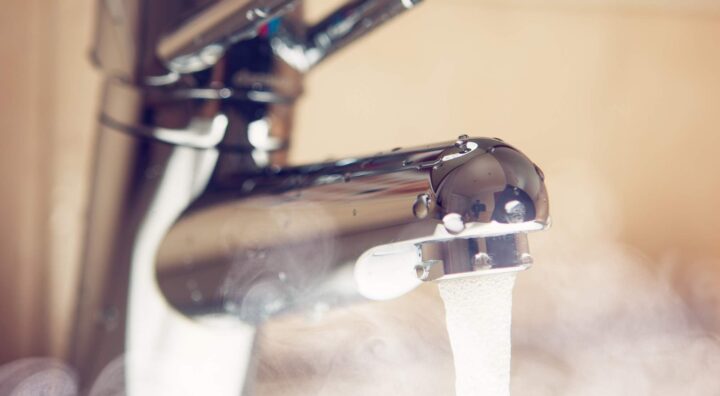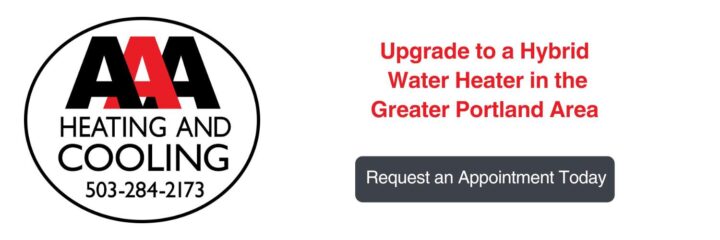
You sleepily stumble into the bathroom in the morning and turn on the shower.
A hot shower will wake you up before work. However, stepping under the spray of water, you are met with icy needles of frigid temperatures. Jumping back, you impatiently wait for the water to turn warm, but to no avail.
You know your home’s hot water heater was not optimally functioning some days, but now it has finally given up the ghost.
When you are faced with expected — or unexpected — home repairs, you prefer to complete some research for not only the best solution, but also energy-saving products. In this case, you’ve heard about hybrid water heaters, but aren’t sold on them yet.
Read further for more information about hybrid water heaters, and if it’s worth buying one for your Portland area home.
Table of Contents
- What Is a Hybrid Water Heater and How Does It Work?
- Is It Worth Buying a Hybrid Water Heater?
- How Much Can You Really Save With a Hybrid Water Heater?
- How Long Does a Hybrid Water Heater Last?
- Frequently Asked Questions About Hybrid Water Heaters
- Upgrade To Smarter Hot Water—Let AAA Heating & Cooling Help You Decide

What Is a Hybrid Water Heater and How Does It Work?
Hybrid water heaters, also referred to as heat pump water heaters, work by combining a heat pump with traditional electric heating elements.
A hybrid water heater heats your water just like a heat pump works to heat your home. However, instead of creating heat to warm the water, this type of water heater transfers heat from the outside or surrounding air to the tank’s heat exchanger. The warmth from the exchanger then heats your water and distributes it throughout your home.
The method of heating with a hybrid water heater is more efficient than the standard electric units.
What Are the Advantages of a Hybrid Water Heater?
Of course, the main advantage homeowners are seeking is money savings.
But what are some of the other potential advantages of a hybrid water heater?
- Homeowners may realize a faster return on their investment compared to other products.
- Dehumidification of the surrounding air occurs during operation, which helps in conditioned spaces.
What Are the Disadvantages of a Hybrid Water Heater?
While there are advantages to hybrid water heaters, there are some disadvantages, too.
The downside of hybrid water heaters may include:
- Hybrid water heaters come with higher installation costs than traditional water heaters.
- Hybrid water heaters require a larger space for ventilation, which may not be an option for smaller homes or spaces.
- The units create some noise from the heat pump and should not be installed in noise-sensitive areas.
- Hybrid water heaters have a slightly longer recovery time compared to gas or electric units.

Is It Worth Buying a Hybrid Water Heater?
When considering buying a hybrid water heater, a logical argument is cost versus long-term savings.
Hybrid water heaters are the most efficient and low-maintenance water heaters on the market, and may be worth the cost — especially if you plan to remain in your present home. AAA Heating and Cooling professionals are happy to help customers calculate the return on investment potential before purchase.
Additionally, energy rebates and tax credits are available in Oregon for eligible products, which will possibly save you more money.
Hybrid Water Heater vs. Standard Water Heater
Standard water heaters use electrical power or natural gas to generate hot water and then store it in a tank until it is needed. The system uses a series of heating elements that produce the heat and warms the water. When the water is heated to the temperature settings at the thermostat, it is stored in a large internal tank until used for tasks.
As hot water is used, more is produced to replace what was contained in the tank. A significant disadvantage of standard water heaters is the loss of heat energy as the hot water waits in the storage tank. If the water cools past the temperature settings, it must be heated again. This constant cycle of cooling and heating can be wasteful, driving up your water-heating expenses.
In contrast to standard and tankless water heaters, hybrid or heat pump water heaters use the highly efficient heat pump process to generate hot water. In general, heat pumps capture heat and either move it away from where it’s not wanted (for cooling) or to places where heat is needed (for heating).
Hybrid Water Heater vs. Tankless Water Heater
Tankless water heaters, also known as on-demand or instantaneous water heaters, do not use a storage tank to hold hot water. Instead, they use heating elements, either operated with electricity or natural gas, to generate hot water as it is used. Since there is no tank, there is no chance of the heat and energy loss associated with hot water storage, which makes these units much more efficient.
Hybrid water heaters use the technology and processes associated with heat pumps to produce hot water for your home. Hybrid heat pump systems produce hot water, either as a separate system or as part of an existing heat pump used to provide HVAC services.
AAA Heating and Cooling experienced professionals can help you decide on which water heater is best for your family and your home’s needs. Contact us today for a consultation and a quote.
How Much Can You Really Save With a Hybrid Water Heater?
Hybrid water heaters can be more expensive to purchase and install, but their efficiency means their operating costs are lower than other types of heaters.
You can save approximately $270 to $550 annually on your electricity bill by switching to a hybrid water heater, with savings potentially reaching over $5,500 over the unit’s lifespan, according to Energy Star.
These savings are a result of the heat pump technology, which uses significantly less energy than a standard electric water heater by transferring heat from the surrounding air rather than solely relying on electricity.
The energy savings will provide a higher return on your investment in a hybrid unit, along with recouping the initial cost in approximately 2-3 years, depending on household usage and installation costs.
Not Just Dollars and Cents: A Greener Way To Heat Your Water
One of the main reasons to switch to a hybrid water heater is its superior energy efficiency. The heat pump compressor uses significantly less electrical energy than traditional electric water heating elements.
Standard electric water heating elements use a nickel-chromium filament surrounded by insulation and a water-proof sheath to heat the water. A high current flow is needed to heat the electric element.
The hybrid water heater uses a compressor motor to heat refrigerant that runs through condenser tubing to heat water. Running the condenser motor to heat the water uses up to 60% less energy than using conventional water heater elements.
Sustainability in Portland is a lifestyle, not just a trend. Eco-conscious homeowners want their homes to reflect their values of environmental stewardship and responsibility. By using less electricity to heat water, hybrid water heaters have a smaller carbon footprint, in turn reducing your home’s overall environmental impact.
Rebates and Incentives for Portland Homeowners
An efficient water heater will help you save on your home’s second-largest energy expense. Water heating accounts for almost 20% of the average home’s energy use. Efficient solutions help you spend less on hot water for the bath, kitchen and laundry room.
By purchasing an energy-efficient unit, you may qualify for Oregon Energy Trust rebates, federal tax credits, and local incentives. AAA Heating and Cooling professionals understand how important it is to save money when possible and are happy to assist customers in navigating and submitting the appropriate forms to secure the rebates and energy tax credits.
How Long Does a Hybrid Water Heater Last?
On average, hybrid water heaters can last anywhere from 13 to 15 years; however, when used and maintained appropriately, it can even last for over 15 years.
How To Maintain Your Hybrid Water Heater for Peak Performance
With any appliance, routine service and maintenance can extend the life and functioning.
What maintenance should be completed on your hybrid water heater?
- Regularly check and clean air filters.
- Inspect and clean the condenser and evaporator coils.
- Maintain adequate clearance for air flow.
- Check the anode rod.
- Monitor temperature and pressure.
- Annually flush the tank.
- Insulate hot water pipes.
As listed above, there are many tasks you can complete as a homeowner to maintain your hybrid water heater by yourself.
However, there are situations that require professional experience, such as:
- Electrical concerns
- Mechanical issues
- Problems that may affect warranty coverage

Frequently Asked Questions About Hybrid Water Heaters
Do Hybrid Water Heaters Work Well in Colder Climates?
Like an HVAC-style heat pump that supplies your home with warmth, these types of water heaters do not work well in temperatures below an average of 40 degrees.
They must be installed where there is enough heat, such as a utility or furnace room, for optimal functioning.
How Quickly Does a Hybrid Water Heater Heat Water?
A hybrid water heater can be slower to heat a full tank than a gas or standard electric heater, taking approximately 60 to 120 minutes to heat a tank from cold in heat pump mode.
However, this time is an estimate and can vary based on factors such as:
- Incoming water temperature
- Ambient air temperature
- Tank size
- Chosen operating mode
Hybrid units have a powerful backup electric element that can quickly heat water during high demand, and some units can be set to prioritize fast heating — although this will utilize more energy.
How Big Is a Hybrid Water Heater?
Hybrid water heaters need at least 1,000 cubic feet to draw in surrounding air.
They are typically larger and taller than standard water heaters, so you may need additional space for installation, particularly if your current water heater is in a confined space.
Also, you will most likely need to adjust water pipes and fittings to install a hybrid water heater.
Can I Install a Hybrid Water Heater Myself?
Installing a hybrid water heater involves both plumbing and electrical skills. If you have experience in both those areas, a DIY installation might be feasible. However, if you’re unsure, it is definitely safer, and most likely cheaper overall, to opt for professional water heater installation.
When installing any kind of appliance, safety is of utmost concern.
With water heaters, incorrect installation can lead to:
- Leaks
- Water damage
- Electrical hazards
- Inefficient operation
- Explosions
If you are going to install your hybrid water heater on your own, make sure you thoroughly read the installation instructions ahead of time, follow all safety guidelines, and double-check your work to minimize these risks as much as possible.
Keep in mind, self-installation errors may cancel out any initial savings or void manufacturer warranties, leading to costly repairs or even the need for a complete reinstallation.
Hiring a licensed professional guarantees that the installation will be done correctly and efficiently. AAA Heating and Cooling professionals are trained to handle all aspects of the installation, from plumbing to electrical work. Hiring a professional ensures that you have hot water and a functional new unit significantly faster than you would have if you would have attempted the installation on your own.
Upgrade To Smarter Hot Water—Let AAA Heating & Cooling Help You Decide
AAA Heating and Cooling has been providing reliable HVAC products to Portland residential and business customers since 1961.
Our family-owned business is dedicated to helping you with your Portland home furnace services by providing quality repairs, service, installations, and excellent customer service.
Whether you are looking for a new water heater, energy-efficient HVAC models, or routine maintenance, we are here for you. Your comfort and health are the top priorities of our expertly trained technicians. Contact us today.
